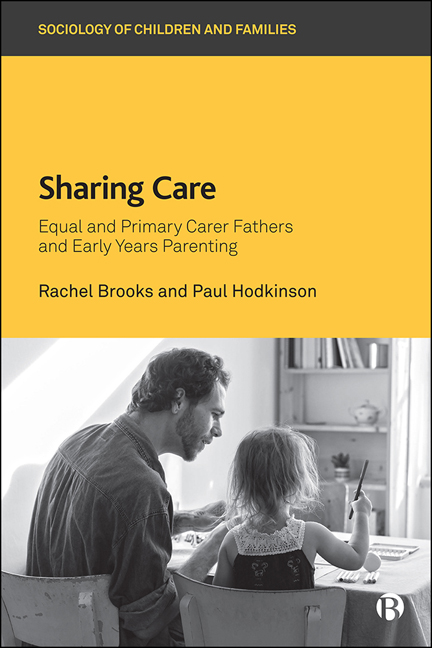Book contents
- Frontmatter
- Dedication
- Contents
- Acknowledgements
- 1 Sharing Care: An Introduction
- 2 Extended Fatherly Involvement: Development and Understandings
- 3 Developing Policy Support for Care-sharing: And its Limitations
- 4 Shifting Care Horizons: Care-sharing Arrangements, Motivations and Transitions
- 5 Developing Fatherly Roles and Identities: Towards Parental Equivalence?
- 6 Daytime Social Isolation from Other Parents
- 7 Care-sharing Futures
- Appendix: Table of Participants
- References
- Index
2 - Extended Fatherly Involvement: Development and Understandings
Published online by Cambridge University Press: 11 March 2021
- Frontmatter
- Dedication
- Contents
- Acknowledgements
- 1 Sharing Care: An Introduction
- 2 Extended Fatherly Involvement: Development and Understandings
- 3 Developing Policy Support for Care-sharing: And its Limitations
- 4 Shifting Care Horizons: Care-sharing Arrangements, Motivations and Transitions
- 5 Developing Fatherly Roles and Identities: Towards Parental Equivalence?
- 6 Daytime Social Isolation from Other Parents
- 7 Care-sharing Futures
- Appendix: Table of Participants
- References
- Index
Summary
Introduction
This chapter provides a critical examination of what we already know about fathers’ involvement in the care of their children. It is structured in two parts. Part I focuses on the now quite extensive literature on fatherly involvement in general, exploring the extent to which approaches and understandings have changed over recent years. We start by outlining the emergence of a pervasive cultural ideal of the ‘involved father’, associated with a shift away from seeing fathers as primarily breadwinners and towards an understanding of fatherhood that is based instead on emotional closeness and a greater sharing of caregiving. We then show how such ideals are not always played out in practice, and explore some of the reasons why, within many families with heterosexual parents, mothers continue to bear the primary responsibility for childcare, and devote considerably more time to care than their male partners. Here we consider: the pull of paid work for fathers; the pressures associated with ‘intensive parenting’ and retaining ‘executive responsibility’ that fall particularly heavily on mothers; and the positioning of fathers as ‘supporters’ or ‘secondary parents’ by healthcare professionals and others. Underpinning all these areas is the operation of traditional gender ideologies, which we consider in the final part of this section.
Part II shifts the focus to the minority of fathers whose practices go beyond what might be expected of a secondary caregiver or supporter, considering the growing literature on stay-at-home dads, fathers who take extended periods of parental leave (some of it caring alone), and those who share care more or less equally with their partners. We explore what existing work suggests about their motivations for taking on such roles; their experiences of caregiving in this way; and the impact of their atypical decisions. We also consider in some detail existing debates about the extent to which such men can be seen to be transforming gender identities or, in Deutsch's (2007) words, ‘undoing gender’. Throughout this section we also highlight the ways in which our own data articulate with such debates, and signal key arguments we will develop in greater depth in subsequent chapters.
- Type
- Chapter
- Information
- Sharing CareEqual and Primary Carer Fathers and Early Years Parenting, pp. 17 - 48Publisher: Bristol University PressPrint publication year: 2020



